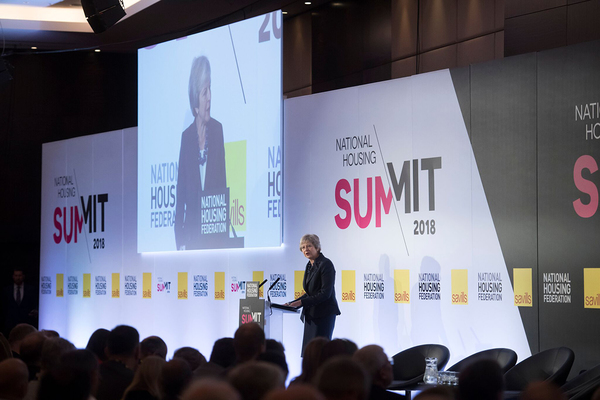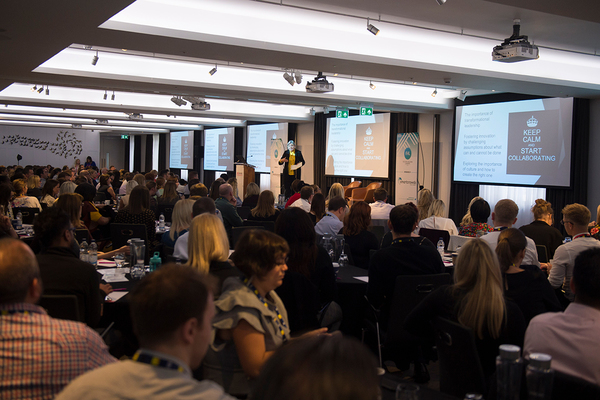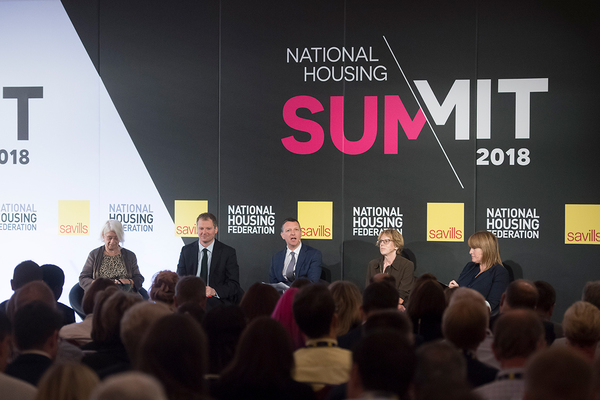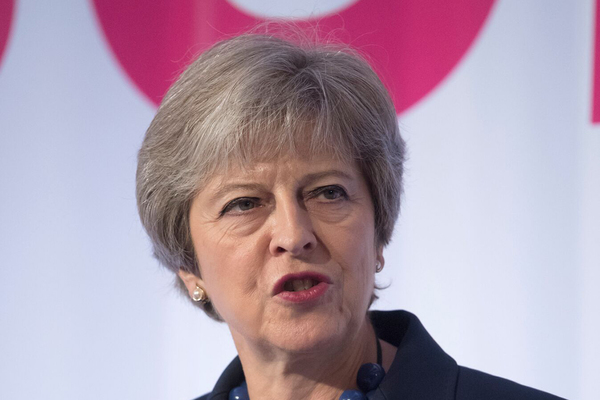You are viewing 1 of your 1 free articles
Dispatch from the Summit: day one
The key talking points and debates from an historic day at the first ’National Housing Summit’ in central London.
Today marked a historic day at the National Housing Federation’s (NHF) first ‘Summit’ in central London as the conference was graced by the prime minister who gave a glowing speech about the housing association sector.
The event, which replaces the previous ‘conference’ in the housing calendar, saw the great and good of the housing world descend on the plush Park Plaza Hotel in Westminster to talk politics, policy and strategic partnerships.
Inside Housing rounds up the key talking points.
May day
The arrival of Theresa May at a housing sector conference was a landmark moment for several reasons. First, she became the first serving prime minister to address a housing sector conference. Second, her warm words about the housing association sector marked the culmination in the sharp change in rhetoric from the government since the nadir of summer 2015. And third, she came bearing gifts - namely £2bn of post-2022 funding for ‘strategic partnerships’, which are the favoured grant mechanism of the large housing associations.
For those in the auditorium, her speech was greeted with rapturous applause and a partial standing ovation. It certainly was a charm offensive. She thanked (retiring NHF boss) David Orr by name, praised housing associations to the skies and gave a personal tribute to the importance of social housing. “I have heard a few people ask if the NHF wrote the speech,” said one senior housing figure. The reaction of the sector was predictably warm.
There were though, some notes of scepticism.
Yeah but…
The £2bn of extra money is going to be part of the 2022 funding round. That means this isn’t a story about lots of new money and instead a story about early guarantees of cash, certainty and the adoption of ‘strategic partner’ model. These are all good things – but the turbulent political backdrop means ‘certainty’ isn’t really a thing anyone can promise. What odds would you take on Ms May still being prime minister by the time this funding actually comes online?
The fact that Ms May dashed straight off to Salzburg to talk about that European thing also demonstrated the extent to which the ‘B’ word dominates the political agenda. However much the sector would like that to be ‘building (new homes)’ it remains Brexit.
Time to deliver
With great power, as Spiderman was so fatefully told, comes great responsibility. Similarly with great backing from Number 10 comes great responsibility to live up to the promises you’ve made about what you can deliver with the support.
Ms May was clear in her speech. She’s granted housing association’s wishes and now she wants payback on her investment. That means housing delivery and it also means quality housing, better estate management and happy residents.
“That’s always a risk, if you ask for things and say ‘Do this and this and it will be easier for us to deliver’, that if your bluff gets called and you don’t deliver that’s not going to be good,” said Mr Orr.
One thing to consider: ministerial speeches in recent years have made a big point of how housing associations can keep building in a market downturn. Can they still with such reliance on cross-subsidy? If that other ‘B’ word doesn’t go too well, we may not have to wait too long to find out.
Brexit means Brexit
On which note, the first of these sessions on the agenda on Brexit featured three heavyweight figures from the housing world: Paul Hackett, chair of the G15 and chief executive of Optivo, Peter Andrew, vice-chair of the Home Builders Federation, and Melanie Leech, chief executive of the British Property Federation.
With his presentation, Mr Hackett neatly laid out the threats and opportunities presented to housing associations by Brexit. Broadly speaking, he highlighted five key areas: house prices, construction, investment, tenant income and jobs. Each are grounds for uncertainty, but he took a reasonably optimistic tone. For instance, he argued that the severing of labour from EU countries - which could slash numbers of available builders and extra care workers - also provides the sector with a chance to build on its apprenticeships work. Notably, when asked at the end of the session, all three speakers said they expect the housing industry to be in a better position in 10 years after Brexit’s full impact has bedded in.
Howdy strategic partner
It may have been cold in the main hall, with the air conditioning still set to heatwave levels, but speakers had warm sentiments for Homes England during a session on strategic partnerships - which had just received the backing of Ms May.
Matt Harrison of Great Places told the audience: “In terms of money, our long-term planning now is great. In terms of treasury strategy – I mentioned bonds – we can really think about how we fund our organisation in the longer term.
“There are some real opportunities there, notwithstanding what might happen in terms of Brexit.”
Jackie Jacob, who has led strategic partnerships at Homes England, revealed that the agency spoke to 90 housing associations in their discussions on how the partnerships should work.
Eight were eventually chosen as partners out of a total pool of 21 associations bidding.
Regeneration games
Later, a session on regeneration saw Bristol mayor Marvin Rees go against the party line. Asked by Inside Housing if he thought Bristol should see resident ballots for estate regeneration, the Labour man said he was “wary of referendum-based decisions”.
Ballots are now Labour Party policy and have been adopted in London by Sadiq Khan, but Mr Rees said: “I’d be wary about people saying no, when we think something actually needs to happen, a change needs to happen.
“I’m not saying [Sadiq Khan] is wrong to have done what he’s done, but in my city my hope is that what we can do is enter into a collection of trusting relationships – if I can say that now that I’m officially a politician – and talk to people, engage with the community and come up with a decision.”
Getting engaged
The last session of the day focused on tenant engagement. Set firmly in the post-Grenfell context, panellists were asked to discuss how housing associations can ensure they are really involving their residents. Among them was Samia Badani of the Notting Dale Residents Advisory Board - which has done extensive tenant work in Kensington and Chelsea since the Grenfell disaster.
She posited that the term “engagement” is overused - that tenants have become cynical towards it. Speaking to just two or three tenants, she pointed out, could be seen as engagement. Instead, she proposed that landlords properly “redefine the relationship” with their tenants - including, vitally, giving them the chance to “co-decide” on some issues.
Meanwhile, Aasia Nisar, community engagement and scrutiny manager at Sovereign, emphasised the importance of allowing tenants to challenge landlords openly. Only that way, she said, can the relationship grow and improvements be made.
Premier league
There was also some discussion of sector league tables - as proposed in last month’s Social Housing Green Paper. John Giesen, chair of Tpas, was critical of the notion. He suggested tables will lead to tickboxing and suggested the central question housing associations need to ask themselves is simply: “how many of your tenants would recommend you to someone else as a landlord?”
Alison Inman, president of the Chartered Institute of Housing, questioned the purpose of league tables - and whether people in need of housing have the luxury of holding out for a higher-ranking landlord. She said there are “more subtle ways” of driving improvement than naming-and-shaming - such as “old fashioned housing management… being human and listening when people are telling you things you don’t want to hear.”
The conference continues tomorrow
More on Theresa May's NHF speech
All our coverage of Theresa May's historic speech on 19 September, 2018, in one place:
Orr: 'penny has dropped' for government on housing The outgoing chief executive of the National Housing Federation gives his take on May's speech
LGA warns May’s focus on associations ’misses the point’ about council-led building Reaction to the announcements from Lord Gary Porter, chair of the Local Government Association
Sector leaders hail ‘huge significance’ of May’s NHF speech Housing figures welcome the Prime Minister’s speech to the National Housing Federation’s annual conference in London
May’s speech shows a significant change in attitude towards the sector When was the last time a Conservative prime minister made a speech more favourable to social housing?, asks Jules Birch
In full: Theresa May’s speech to the National Housing Summit The full text of the Prime Minister’s historic speech
Theresa May throws support behind housing associations in landmark speech Read more about Theresa May’s speech which signalled a change in tone from the government towards housing associations
May’s new £2bn funding will not be available until 2022 Homes England clarifies the timescale for allocation of the new money promised by the Prime Minister
Morning Briefing: Labour hits back at May’s £2bn housing pledgeShadow housing secretary John Healey says May’s pledges are not enough
May to announce £2bn for strategic partnerships with associations at NHF conference The details released overnight ahead of the speech




